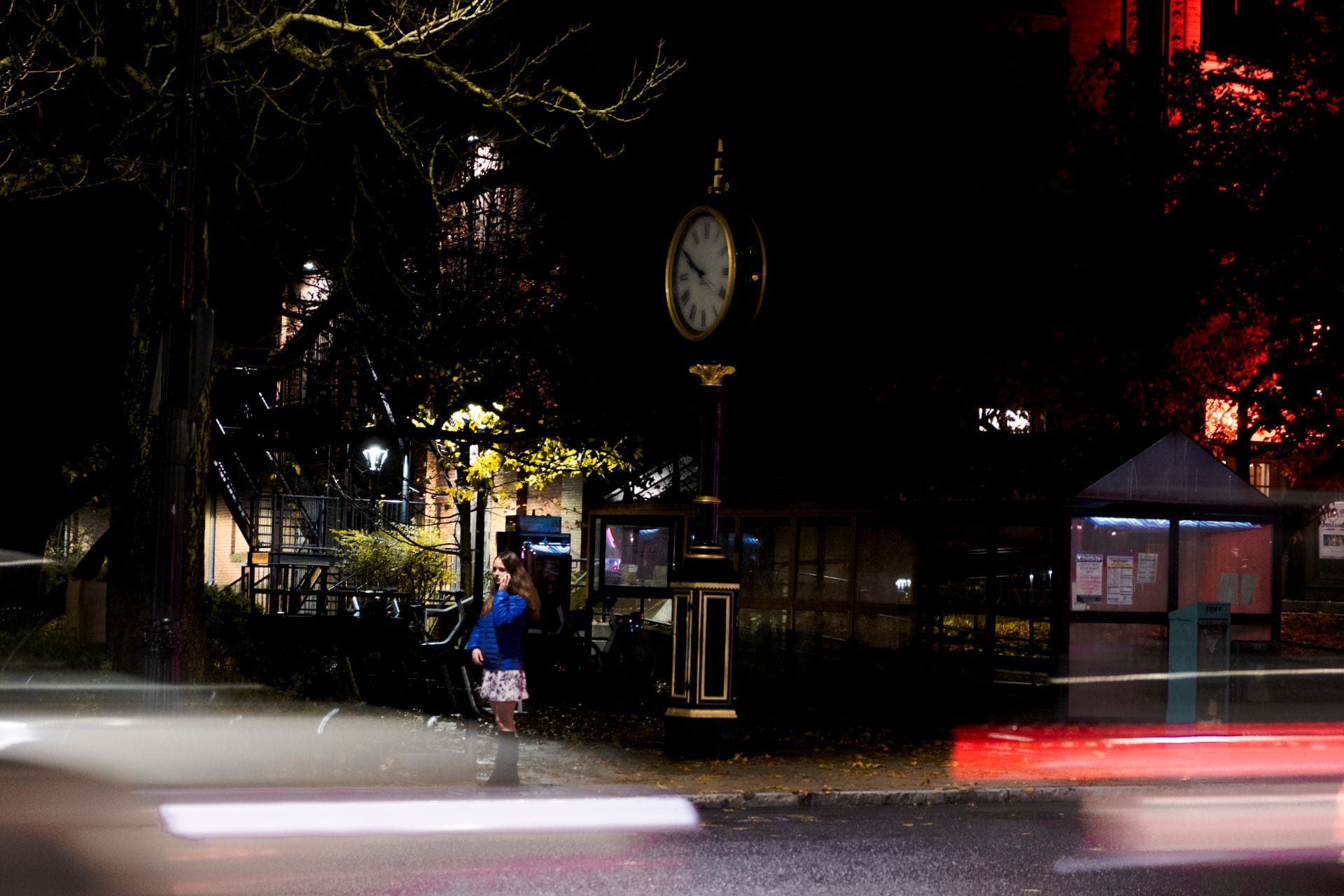“Sauntering along these wooden planks, sputtering words into the studded dusk, syllables falling, slipping onto the chiaroscuro of the busy walkway under my feet, that’s why I’m here, that’s why I’m calling, to remember to record and to record to remember. My lips, dry like forgotten flowers, unwatered but dotted with evaporating droplets of spittle, every expulsion of air condensed into trailing, fleeting streams of water vapor that dip with the weight of all the syllables tumbling tangibly from my tongue, descending into the intangible in this art of presence and absence. Do we belong to history, or is it ours? Does it course through us, or leak out of our veins in fluid currents like that of the East River below? Does it direct our synaptic pathways in electrical currents like that of the surrounding city, flickering in advance of the physical body? ‘I love you,’ says a girl who just shoved past me, the aura of her existence radiating from her glittering jacket and knee-high snake-skin boots, ‘I love you, I love you, I love you;’ her phone relays this message, this transliterated rhythm of a thrumming, beating organ, across space and time to an unknown recipient who doesn’t ignore her call, who will listen. Anyway, it’s just me again, with drying lips as usual, calling to check in, to tell you that I miss you and that you need to call me back, to let you know that I’m here in the cut across worlds on this bridge that you and I know so well, Brooklyn to my back sparkling in the past, lower Manhattan ahead of me, blinking, signaling out to me from some unknown futuristic era, like Long Island fireflies. What must it be like to forever stay here in this pulsating artery of the city, this bridge between two temporalities; what must it be like to escape the inevitability of being governed by time, that invisible force driving us downwards into subway catacombs, into perfunctory performances dictated by mechanicalness and haste; what must it be like to say words that will reverberate in the air for more than an instant, not having dissipated into the chiaroscuros of the city after cold air pierces my lungs following every breath needed for my next utterance? Remembering the steady rhythms of the girl’s message is not the same as hearing it in the present, I love you, I love you, I love… her cryptic energy, irreplicable, having been lost as all words are to time, in the forward-moving crowds of passersby and bikers and blurred rectangles of yellow taxis tailed with glaring streaks of glowing rubies, all of which will propel me towards the underground of lower Manhattan, where I will take the train back to college, where I will shift in an uncomfortable chair to learn, nodding and pretending to understand this cut-throat business of literary labor as I listen to my professor falling forward into his prose. Typing, erasing, scribbling into the darkest hour, the intensity of my desk lamp spotlighting a shaky, incompetent hand gripping a pen, repeatedly falling out of the rhythms it is eager to create; ‘Is that a real job?’ you ask inaudibly, shrouded in shadows as I struggle to decipher your fatherly facial expressions, fading, gone. The absence of presence and the presence of absence: painful, yes, though it is this that gives me my life’s work, the impossible task of time-travel, the ‘I’ of the now unidentical to that of the second before; every word, every phrase, every changing phrase assembling a whole message defined by a concatenation of different present tenses that will throw the voice across eons, dependent on a recipient in the near or distant future. Walking on this bridge, Roebling’s steel cables splitting my vision into fragments, the lower Manhattan skyline still twinkling, Long Island fireflies, the heated and turbulent air of the city distorting the path of light to my eyes; overhead in the craquelure of clouds the stars are unreachable, some too young, invisible to the eye, and their light will reach in due time, their tireless little celestial hearts traveling three hundred million meters every second to illuminate onto other members of the human enterprise after our world has been altered beyond recognition, my atomic presence in the now, under dying light. My hands, holding this phone, my eyes starlight, light that will soon pass—are you looking upwards, too? I’m wondering because I miss you, please call me back, throw your voice across eons alongside mine, but no, no, I suppose this is the nature of this art, the art of presence and absence in this prose poem, intimacy in distance, in slipping, away… I’ve reached Manhattan, my eyes citylight.”
Jackeline Fernandes ’24 is a staff writer
jfernandes24@amherst.edu
Hantong Wu ’23 is a staff artist
hwu23@amherst.edu
